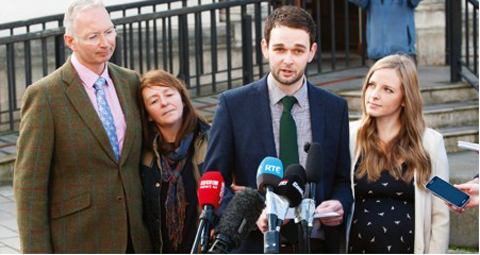May 4 | ![]() 0 COMMENTS
0 COMMENTS ![]() print
print

The Ashers case: small cake, but big implications
The Christian Institute’s James Gillies looks at a troubling decision - By James Gillies
This week, judges in the UK’s highest court considered the case of a small baking company in Northern Ireland. During the two-day hearing, the bakery put forward arguments relating to a request for a cake four years ago.
Based on this information alone, you could be forgiven for wondering what all the fuss was about.
But as unlikely as it seems, this case had profound implications for the freedoms of people across the UK.
Here’s some background to the case and an explanation of why it matters so much.
Ashers Baking Company was sued in 2014 after politely declining an order to decorate a cake with the slogan ‘Support Gay Marriage.’
Daniel McArthur, general manager of Ashers, has said: “We took issue with the message on the cake and not the customer and as a family we believe we should retain the freedom to decline business that would force us to promote a cause with which we disagree.”
The McArthur family came to The Christian Institute for help in 2014, when the Equality Commission for Northern Ireland threatened legal action on behalf of the gay rights activist who placed the order.
We helped defend them when they were brought before Belfast County Court. Shockingly, the judge ruled that they had discriminated on three grounds: sexual orientation, religious belief, and political opinion.
We helped them go to the Court of Appeal. But it upheld the previous ruling. Now we are helping them appeal to the UK Supreme Court.
The way the UK Supreme Court interprets the law in the Ashers case is vital. It will determine how equality law in other parts of the UK is applied.
First, it will determine how Scotland, England and Wales apply something called ‘associative discrimination,’ At present, discriminating against a person because of their race, religion or sexual orientation is unlawful.
It is also unlawful for a shop owner to refuse a customer because of the race, religion or orientation of their friend.
But the McArthur family are not held to have done this. They didn’t know, or act upon, the orientation of the customer. They served him previously and would have done so again. Instead, the family were held to have discriminated because the wording they declined to produce—’Support Gay Marriage’—is ‘associated with’ gay people.
This aspect of the ruling has created a novel and worrying extension to the law.
In effect, it means that you can be guilty of discriminating against an idea—such as gay marriage—because it is associated with a particular group of people.
The finding is hugely problematic for free speech, which should allow people to challenge and reject ideas full stop.
Another way the Ashers ruling affects the rest of the UK is related to religion and belief.
The County Court said where a person’s act is motivated by his own religious belief this can constitute discrimination on grounds of religious belief.
This risks turning the entire purpose of religious discrimination law on its head.
Rather than protecting religious people it may deem their faith-motivated actions to be unlawful. This is particularly concerning since, unlike race or sexual orientation, religious belief governs the whole of a person’s life and actions.
The McArthurs are upfront about their Christian beliefs in their business dealings. They do not open on Sunday. They have turned down other cake orders for religious reasons, including designs involving nudity or bad language. They even named their business after the Biblical tribe of Asher.
Ashers is not a faceless multinational but a family business where the owners are closely involved in the work. This means their individual human rights are engaged in a way that would not be true for a large corporation.
If turning down orders for religious reasons is deemed ‘discrimination,’ then refusing to promote a nightclub, for example, could become illegal—even though nightclubs do not come under any protected characteristic in equality law.
People from all walks of life support Ashers because they recognise their own freedom could be infringed.
The McArthurs were asked to use their best efforts, to help promote something against their Christian beliefs.
But no one should be forced to use their creative skills to celebrate ideas totally at odds with their own.
If the Ashers ruling stands, a Roman Catholic printer could be punished for refusing to print literature calling for abortion on demand.
An atheist web designer could be punished for refusing to design a site supporting creationism.
And a lesbian-owned T-shirt company could be punished for refusing to print T-shirts describing gay marriage as an ‘abomination.’
The McArthur family don’t want to live in that kind of world.
The Supreme Court should rule in their favour, for the freedoms of all people across the UK.










